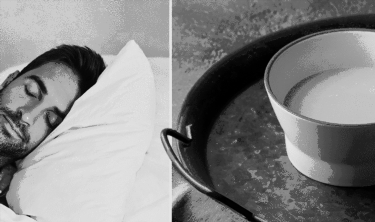Dr Michael Mosley on the importance of routine for sleep
We use your sign-up to provide content in ways you’ve consented to and to improve our understanding of you. This may include adverts from us and 3rd parties based on our understanding. You can unsubscribe at any time. More info
Sleep energises the body and helps to ward off serious health problems, such as diabetes, heart attack and stroke. Despite the material benefits, a plurality of Britons are sleep-deprived. Fortunately, you can remedy sleep loss by making simple dietary tweaks, research suggests.
One promising sleep aid is malted milk, which is made by combining milk and a specially formulated powder that contains primarily wheat flour, malted wheat, and malted barley along with sugar and an assortment of vitamins.
It is popularly known as Horlick’s – the name of a popular brand of malted milk powder.
“In the past, small studies found that malted milk before bed reduced sleep interruptions,” reports the Sleep Foundation.
The health body cites a particular study entitled “Sleep after a bedtime beverage”.

In the study, published in the BMJ, sleep after an inert capsule was compared with sleep after a hot, bedtime, milk-cereal drink (Horlicks).
All-night electrophysiological recordings were made with 18 persons on 10 nights each.
Restlessness during sleep at the end of the night was diminished after Horlicks in a group of 10 young adults.
In an older group of eight adults, mean age 55 years, sleep after Horlicks was of longer total duration and was less broken by periods of wakefulness.
DON’T MISS
Diabetes: People who cut down on coffee could raise risk [ADVICE]
Vitamin B12: Problem with understanding is a sign [INSIGHT]
Pfizer fourth vaccine booster: Side effects to expect [TIPS]
In the latter group the improvement associated with Horlicks was most apparent late in the night and it increased with repeated administration.
What accounts for this effect?
The Sleep Foundation says: “The explanation for these benefits is uncertain but may have to do with the B and D vitamins in malted milk.”
As the health body points out, milk itself contains melatonin, and some milk products are melatonin-enriched.
When cows are milked at night, their milk has more melatonin, and this milk may be useful in providing a natural source of the sleep-producing hormone.

Other sleep hacks
According to the NHS, keeping a regular sleeping routine can work wonders.
The health body explains: “Going to bed when you feel tired and getting up at roughly the same time helps teach your body to sleep better.”
However, you should try to avoid napping where possible, it adds.
Furthermore, you can create a bedroom environment that’s conducive to sleep.

Being too hot or too cold at night can affect your sleep.
“The best temperature for sleep is 18 degrees, give or take a few degrees,” says Bupa.
“So, adjust your heating and layer your bedding to find the right temperature for you.”
It also says:
- Lots of different noises – for example, street sounds and wildlife noises – can wake you in the night. Earplugs may help. If your partner snores, encourage them to seek medical advice
- Your bedroom needs to be dark at night. Too much light can make it harder to sleep. You may need thicker curtains or blackout blinds if you’re blasted with sunlight in the morning, especially in the summer. Or you could try wearing an eye mask.
Source: Read Full Article
